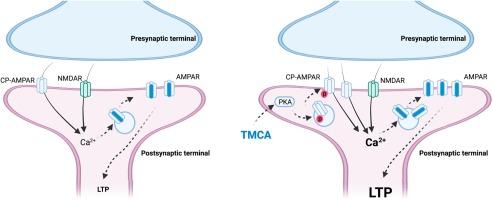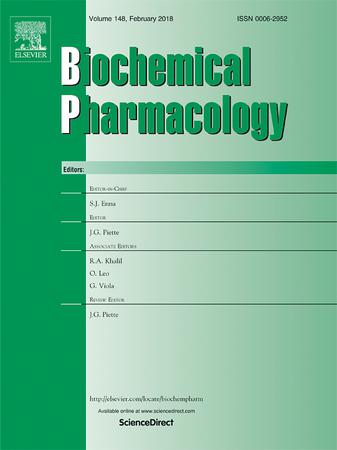从远志中分离出的 3,4,5-三甲氧基肉桂酸甲酯可通过 PKA 和钙离子渗透 AMPA 受体增强海马 LTP
IF 5.3
2区 医学
Q1 PHARMACOLOGY & PHARMACY
引用次数: 0
摘要
阿尔茨海默病(AD)是一种退行性脑部疾病,其特征是由于淀粉样蛋白β(Aβ)在细胞外沉积和tau蛋白在细胞内沉积而导致认知能力逐渐下降和神经元死亡。最近批准的针对 Aβ 的抗体药物已被证明可以减缓疾病的进展,但对认知能力的改善作用甚微。因此,有必要开发具有增强认知能力作用的药物,以便与这些抗体治疗同时使用。在这项研究中,我们研究了传统上以增强认知能力而闻名的远志(Polygala tenuifolia,PT)能否改善突触可塑性,并确定了其活性成分和机制。PT在增强长期电位(LTP)方面表现出剂量依赖性效应,其成分中的3,4,5-三甲氧基肉桂酸甲酯(TMCA)也表现出类似的LTP增强效应。TMCA 增加了α-氨基-3-羟基-5-甲基-4-异恶唑丙酸受体 GluA1 亚基的磷酸化,并增加了突触上 GluA1 的数量,而不影响 GluA2 的数量。此外,TMCA 诱导的 GluA1 的增加受到 PKA 抑制剂的抑制。与这些结果一致的是,TMCA 对 LTP 的增强作用受到 GluA1 拮抗剂和 PKA 抑制剂的抑制。硅学分子对接实验证实了 TMCA 与 PKA 的结合。最后,我们证实了 TMCA 在 5XFAD 小鼠海马切片中的 LTP 增强效应。这些结果表明,PT 及其活性成分 TMCA 可与 PKA 相互作用,增强 LTP,从而有望改善 AD 患者的认知功能。本文章由计算机程序翻译,如有差异,请以英文原文为准。

3,4,5-trimethoxycinnamic acid methyl ester isolated from Polygala tenuifolia enhances hippocampal LTP through PKA and calcium-permeable AMPA receptor
Alzheimer’s disease (AD) is a degenerative brain disorder characterized by progressive cognitive decline and neuronal death due to extracellular deposition of amyloid β (Aβ) and intracellular deposition of tau proteins. Recently approved antibody drugs targeting Aβ have been shown to slow the progression of the disease, but they have minimal effects on cognitive improvement. Therefore, there is a need to develop drugs with cognitive-enhancing effects that can be used in conjunction with these antibody treatments. In this study, we investigated whether Polygala tenuifolia (PT), traditionally known for its cognitive-enhancing effects, can improve synaptic plasticity and identified its active components and mechanisms. PT demonstrated a dose-dependent effect in enhancing long-term potentiation (LTP), and among its components, 3,4,5-trimethoxycinnamic acid methyl ester (TMCA) showed a similar LTP-enhancing effect. TMCA increased the phosphorylation of the GluA1 subunit of the α-Amino-3-hydroxy-5-methyl-4-isoxazolepropionic acid receptors and increased the amount of GluA1 on the synapse without affecting the amount of GluA2. Additionally, the increase in GluA1 induced by TMCA was inhibited by a PKA inhibitor. Consistent with these results, the enhancement of LTP by TMCA was inhibited by a GluA1 antagonist and a PKA inhibitor. In silico molecular docking experiments confirmed that TMCA binds to PKA. Finally, we confirmed the LTP-enhancing effect of TMCA in hippocampal slices from 5XFAD mice. These results suggest that PT and its active component, TMCA, can interact with PKA to enhance LTP, indicating the potential for improving cognitive function in AD patients.
求助全文
通过发布文献求助,成功后即可免费获取论文全文。
去求助
来源期刊

Biochemical pharmacology
医学-药学
CiteScore
10.30
自引率
1.70%
发文量
420
审稿时长
17 days
期刊介绍:
Biochemical Pharmacology publishes original research findings, Commentaries and review articles related to the elucidation of cellular and tissue function(s) at the biochemical and molecular levels, the modification of cellular phenotype(s) by genetic, transcriptional/translational or drug/compound-induced modifications, as well as the pharmacodynamics and pharmacokinetics of xenobiotics and drugs, the latter including both small molecules and biologics.
The journal''s target audience includes scientists engaged in the identification and study of the mechanisms of action of xenobiotics, biologics and drugs and in the drug discovery and development process.
All areas of cellular biology and cellular, tissue/organ and whole animal pharmacology fall within the scope of the journal. Drug classes covered include anti-infectives, anti-inflammatory agents, chemotherapeutics, cardiovascular, endocrinological, immunological, metabolic, neurological and psychiatric drugs, as well as research on drug metabolism and kinetics. While medicinal chemistry is a topic of complimentary interest, manuscripts in this area must contain sufficient biological data to characterize pharmacologically the compounds reported. Submissions describing work focused predominately on chemical synthesis and molecular modeling will not be considered for review.
While particular emphasis is placed on reporting the results of molecular and biochemical studies, research involving the use of tissue and animal models of human pathophysiology and toxicology is of interest to the extent that it helps define drug mechanisms of action, safety and efficacy.
 求助内容:
求助内容: 应助结果提醒方式:
应助结果提醒方式:


